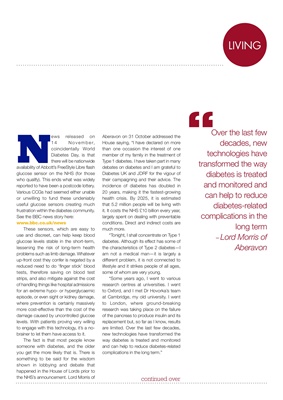
KITLIVING
N
ews released on
14 November,
coincidentally World
Diabetes Day, there
will be nation-wide
availability of Abbott's FreeStyle Libre flash
glucose sensor on the NHS (for those who
qualify) thereby ending what was widely
reported to have been a postcode lottery.
Various CCGs had seemed either unable
or unwilling to fund these undeniably
useful glucose sensors creating much
frustration within the diabetes community.
See the BBC news story here:
www.bbc.co.uk/news
These sensors, which are easy to use
and discreet, can help keep blood glucose
levels stable in the short-term and lead to
a lessening of risk of long-term health risks
like amputations. Whatever up-front cost
they confer is negated by a reduced need
to do 'finger stick' blood tests, therefore
saving on blood test strips, and also
mitigate against the cost of handling things
like hospital submissions for an extreme
hypo- or hyperglycaemic episode, or sight
loss or kidney damage, where prevention
is certainly massively more cost effective
than the damage caused by uncontrolled
glucose levels. With patients proving very
willing to engage with this technology, it's
a no-brainer to let them have access to it.
The fact is that most people know
someone with diabetes, and the older
you get the more likely that is. Far from it
for us to say that everyone in the House
of Lords is old, but there is something to
be said for the wisdom shown in lobbying
and debate that happened prior to the
NHS's announcement. Lord Morris of continued over
Aberavon on 31 October addressed the
House saying, "I have declared on more
than one occasion the interest of one
member of my family in the treatment of
Type 1 diabetes. I have taken part in many
debates on diabetes and I am grateful to
Diabetes UK and JDRF for the vigour of
their campaigning and their advice. The
incidence of diabetes has doubled in
20 years, making it the fastest-growing
health crisis. By 2025, it is estimated
that 5.2 million people will be living with
it. It costs the NHS £10 billion every year,
largely spent on dealing with preventable
conditions. Direct and indirect costs are
much more.
"Tonight, I shall concentrate on Type 1
diabetes. Although its effect has some of
the characteristics of Type 2 diabetes-I
am not a medical man-it is largely a
different problem, it is not connected to
lifestyle and it strikes people of all ages,
some of whom are very young.
"Some years ago, I went to various
research centres at universities. I went
to Oxford, and I met Dr Hovorka's team
at Cambridge, my old university. I went
to London, where ground-breaking
research was taking place on the failure
of the pancreas to produce insulin and its
replacement but, so far as I know, results
are limited. Over the last few decades,
new technologies have transformed the
way diabetes is treated and monitored
and can help to reduce diabetes-related
complications in the long term."
Over the last few
decades, new
technologies have
transformed the way
diabetes is treated
and monitored and
can help to reduce
diabetes-related
complications in the
long term
- Lord Abervon
"